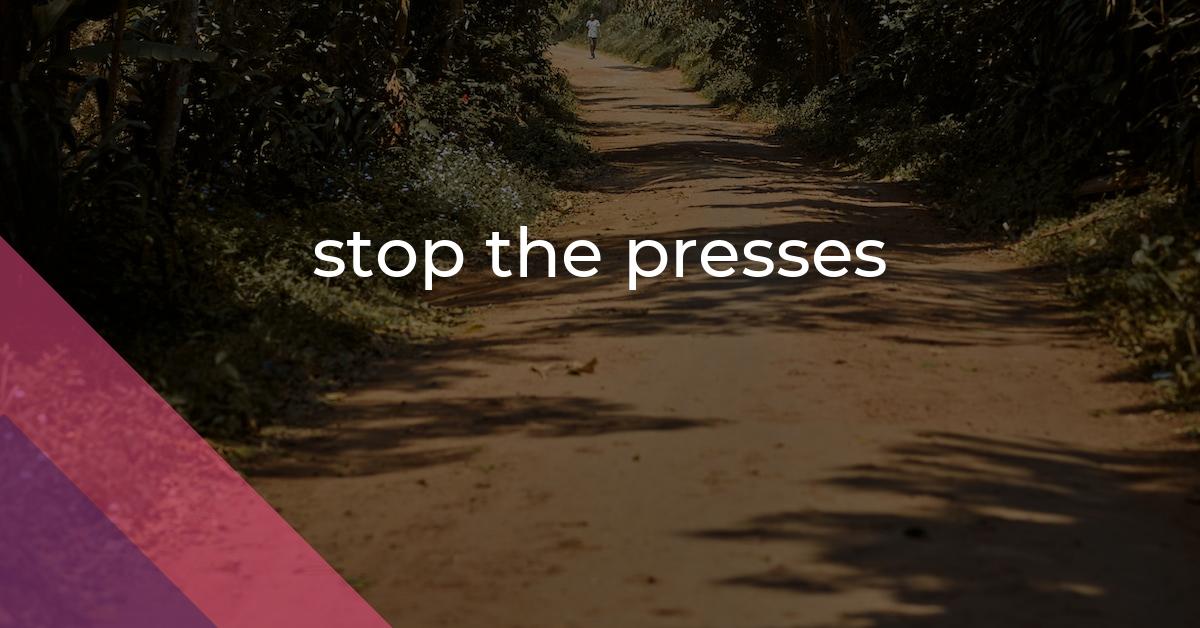stop the presses: Idiom Meaning and Origin
What does ‘stop the presses’ mean?
The idiom stop the presses means to halt the printing process of a newspaper to include or emphasize breaking news. It is used figuratively to express the urgency of stopping or interrupting regular activities.

Idiom Explorer
The idiom "yellow press" refers to journalism that is sensationalist and biased, often relying on exaggerated or fabricated stories to attract readership. It originated from the use of yellow ink in the headlines of such newspapers in the late 19th century.
The idiom "stop the lights" is an Irish slang phrase used to express surprise or astonishment. It is often used in a humorous or exaggerated way to emphasize a reaction or to convey disbelief.
"Stop the bleeding" is an idiom that means to take immediate action to prevent further losses or damages, especially in a financial or organizational context.
The idiom "stop someone in their tracks" means to halt or interrupt someone suddenly, causing them to pause or cease their current action or thought. This expression implies a strong, unexpected impact or surprise that prevents further progress or movement.
The idiom "stop press" refers to a situation where the printing of a newspaper or magazine is momentarily halted to include late-breaking news or updates.
The idiom "stop dead" means to suddenly and completely stop moving or doing something, often due to shock, surprise, or fear.
The idiom "stem the tide" means to stop or slow down the flow or progress of something, often a negative or undesirable situation.
The idiom "slam on the brakes" means to suddenly apply the brakes of a vehicle forcefully and abruptly to bring it to a rapid stop.
The idiom "put the brakes on" means to slow down or stop a process or action. It is often used to describe taking measures to control or limit something that is happening too quickly or becoming out of control.
FAIL
The idiom "stop press" is closely related to "stop the presses." It is often used as a headline or preface to indicate that new information has just come in and is being added to a previously published article or story. Much like "stop the presses," "stop press" conveys a sense of urgency and the need to immediately incorporate the latest and most up-to-date information into the publication.
Another closely related idiom is "hot off the presses." This phrase is often used to describe something that has just been printed or published and is still fresh and new. It is commonly used to convey a sense of excitement and immediacy, as if the ink on the page is still wet. The phrase "stop the presses" can be used in a similar context to emphasize that the information being added or revised is so important or significant that it must be incorporated before the publication goes to print.
"put a stop to" is another idiom that can be related to "stop the presses." This phrase is used to mean to halt or end something, typically an activity or a process, often to prevent further action or to address a problem. In the context of "stop the presses," it can be used to convey the idea that the printing and publishing process is interrupted or halted in order to address a new development or make urgent changes. The phrase "stop the presses" captures this sense of immediate cessation and the need to take action in response to a significant event or piece of information.
"stop someone in their tracks" is yet another idiom that can be related to "stop the presses." This phrase is used to describe a sudden and unexpected interruption or disruption that causes someone to pause or come to a complete stop. In the context of "stop the presses," it conveys the idea that the news or information being incorporated is so compelling or shocking that it has the power to immediately capture someone's attention and make them pause in their current activity or train of thought.
Finally, "put the brakes on" is an idiom that can be related to "stop the presses." This phrase is often used to mean to slow down or bring something to a halt, typically to prevent further action or to address a problem or potential danger. In the context of "stop the presses," it signifies the immediate cessation of the printing press in order to address a breaking news story or make necessary revisions. The phrase "stop the presses" and "put the brakes on" both convey a sense of urgency and the need for immediate action to address an unforeseen or important development.
Example usage
Examples of how the idiom *stop the presses* can be used in a sentence:
- Stop the presses! We have breaking news!
- She scored a winning goal in the last minute of the game, it was definitely a stop-the-presses moment.
- They announced a new product launch, and it immediately stopped the presses in the industry.
More "Phrases" idioms



